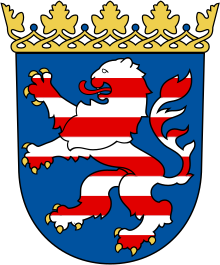»
»
»
Hessen
Hessen

Hesse is a parliamentary republic and a partially sovereign member state (state) of the Federal Republic of Germany. It is the fifth largest of the sixteen countries by population. It borders in the north on Lower Saxony, in the west on North Rhine-Westphalia and Rhineland-Palatinate, in the east on Bavaria and Thuringia and in the south on Baden-Württemberg. After the Congress of Vienna in 1815, the territory of today's State of Hesse consisted mainly of the Grand Duchy of Hesse, the Electorate of Hesse, the Duchy of Nassau, the Free City of Frankfurt, the Principality of Waldeck, the Landgraviate of Hesse-Homburg and the Rhine-Prussian area around Wetzlar. Electoral Hesse, Nassau, Hesse-Homburg (which came to Hesse-Darmstadt by inheritance on March 24, 1866) and Frankfurt were annexed by the Kingdom of Prussia in 1866 and combined as the province of Hesse-Nassau. During the Weimar Republic, the former Grand Duchy became the republican people's state of Hesse and Waldeck became part of the Free State of Prussia in 1929. In 1944, the province of Hessen-Nassau was divided into the provinces of Kurhessen and Nassau. After the Second World War, the state of Hesse was founded on September 19, 1945 under the name Groß-Hessen in the American occupation zone and was the first state in the Federal Republic that still exists today to receive a new democratic constitution. The left bank of the Rhine of Rheinhessen, which belongs to the people's state of Hesse, and part of Nassau fell to the French occupation zone and today belong to Rhineland-Palatinate.
 Hesse is a parliamentary republic and a partially sovereign member state (state) of the Federal Republic of Germany. It is the fifth largest of the sixteen countries by population. It borders in the north on Lower Saxony, in the west on North Rhine-Westphalia and Rhineland-Palatinate, in the east on Bavaria and Thuringia and in the south on Baden-Württemberg. After the Congress of Vienna in 1815, the territory of today's State of Hesse consisted mainly of the Grand Duchy of Hesse, the Electorate of Hesse, the Duchy of Nassau, the Free City of Frankfurt, the Principality of Waldeck, the Landgraviate of Hesse-Homburg and the Rhine-Prussian area around Wetzlar. Electoral Hesse, Nassau, Hesse-Homburg (which came to Hesse-Darmstadt by inheritance on March 24, 1866) and Frankfurt were annexed by the Kingdom of Prussia in 1866 and combined as the province of Hesse-Nassau. During the Weimar Republic, the former Grand Duchy became the republican people's state of Hesse and Waldeck became part of the Free State of Prussia in 1929. In 1944, the province of Hessen-Nassau was divided into the provinces of Kurhessen and Nassau. After the Second World War, the state of Hesse was founded on September 19, 1945 under the name Groß-Hessen in the American occupation zone and was the first state in the Federal Republic that still exists today to receive a new democratic constitution. The left bank of the Rhine of Rheinhessen, which belongs to the people's state of Hesse, and part of Nassau fell to the French occupation zone and today belong to Rhineland-Palatinate.
Hesse is a parliamentary republic and a partially sovereign member state (state) of the Federal Republic of Germany. It is the fifth largest of the sixteen countries by population. It borders in the north on Lower Saxony, in the west on North Rhine-Westphalia and Rhineland-Palatinate, in the east on Bavaria and Thuringia and in the south on Baden-Württemberg. After the Congress of Vienna in 1815, the territory of today's State of Hesse consisted mainly of the Grand Duchy of Hesse, the Electorate of Hesse, the Duchy of Nassau, the Free City of Frankfurt, the Principality of Waldeck, the Landgraviate of Hesse-Homburg and the Rhine-Prussian area around Wetzlar. Electoral Hesse, Nassau, Hesse-Homburg (which came to Hesse-Darmstadt by inheritance on March 24, 1866) and Frankfurt were annexed by the Kingdom of Prussia in 1866 and combined as the province of Hesse-Nassau. During the Weimar Republic, the former Grand Duchy became the republican people's state of Hesse and Waldeck became part of the Free State of Prussia in 1929. In 1944, the province of Hessen-Nassau was divided into the provinces of Kurhessen and Nassau. After the Second World War, the state of Hesse was founded on September 19, 1945 under the name Groß-Hessen in the American occupation zone and was the first state in the Federal Republic that still exists today to receive a new democratic constitution. The left bank of the Rhine of Rheinhessen, which belongs to the people's state of Hesse, and part of Nassau fell to the French occupation zone and today belong to Rhineland-Palatinate.
.png)